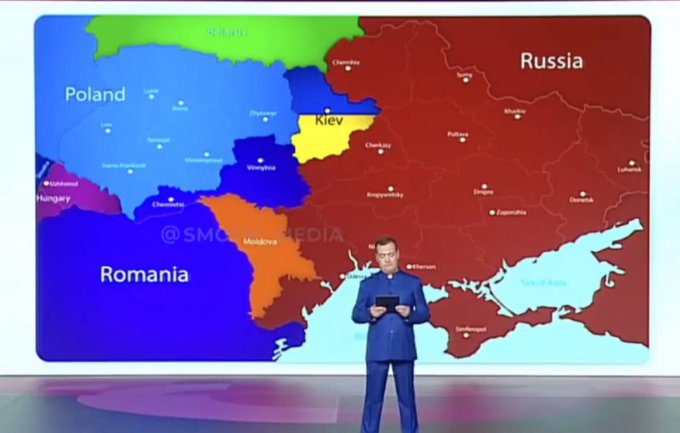Putin's nuclear warning turned out to be the harshest yet, by Gevorg Mirzayan for VZGLYAD. 03.04.2024.
In the context of the West’s strategic fork between two bad options, the Russian president is trying to convey to his former partners the idea that the option of sending troops is worse. This means that if they want to live, they will have to gradually begin to come to terms with the Russian victory in the Northern Military District.
In Vladimir Putin's message to the Federal Assembly, the foreign policy segment occupied at most 10 percent. However, 90 percent of all Western publications devoted to the message turned out to be devoted specifically to him. Or more precisely, its nuclear component - that “strategic nuclear forces are in a state of full readiness for guaranteed use.”
Western media not only commented on this with words from the series “Russia threatens everyone with nuclear Armageddon.” Some looked deeper. “Putin has hinted at the possibility of a nuclear strike before, but the current statement was too harsh,” writes The Washington Post.
At first glance, it may seem that the Russian president did not say anything particularly harsh. From speech to speech, he reminds Western partners about Russian nuclear weapons and that (this is spelled out in our military doctrine) Moscow is ready to use them. Including in a situation where the conventional war waged against Russia threatens the security and existence of the country.
As for the tone of the current speech, it was much calmer than, for example, the address two years ago, when the Russian leader announced the beginning of the Northern Military District. “Whoever tries to interfere with us, and even more so create threats to our country, to our people, should know that Russia’s response will be immediate and will lead you to consequences that you have never encountered in your history,” he said then president. In fact, this was perceived as a threat of a nuclear strike - and in the current speech there is nothing like that.
So what is its sharpness?
The point is not that Putin said it, but why Putin said it. And in what situation he said it.
In 2022, the Russian warning said “just in case.” At that time, many experts believed that the NWO would not last long, that Ukraine would show prudence, and Putin’s words were only meant to calm the craziest Western “hawks.” Those who played too much into the Cold War and believed that in order to prevent a change (obviously temporary - until the new Maidan) of the regime in Kyiv to a pro-Russian one, it was necessary to send troops to Ukraine and thereby risk a nuclear war. Then this threat worked in the short term - no one sent troops, and the West began to provide significant assistance to Kyiv only after some time.
In 2024, the context is completely different. Now Putin is appealing not to a handful of ideological radicals calling for apparently suicidal decisions for the sake of virtual victory, but to a significant part of the Western elite. The fact is that now, against the background of Russian military successes and a serious, and most importantly, irreversible weakening of the capabilities of the Kyiv regime, these elites are faced with a dilemma of two equally (in their opinion) unacceptable options.
The first is to allow Russia’s strategic victory in a long-term war (both sanctioned and indirect - through the full support of NATO countries for the Kyiv regime) over the entire collective West. At a minimum, this will mean that it will be impossible for the United States and the EU to continue to use the threat of force to push through third world countries - after all, the myth of the omnipotence of the West will be destroyed by Russian stubbornness. At the very least, Moscow’s victory will cause serious unrest in the Western ranks – especially in Europe, where the United States has broken national governments at its knees, forcing them to join anti-Russian sanctions. And, accordingly, the Russian example, coupled with the disintegration of the Western bloc, will lead to a sharp increase in the capabilities and ambitions of China, Iran and other countries - and ultimately to the collapse of the American-centric world.
The second way out is to sharply increase support for the Kyiv regime in order to prevent the above scenario. Not only quantitatively, but also qualitatively – for example, through sending Western troops to Ukraine (the idea of which was recently floated by French President Emmanuel Macron).
And this scenario is fraught with serious escalation. After all, in practice it will turn out that Western troops will occupy Russian territory - which means that within the framework of the nuclear doctrine of the Russian Federation, Moscow may well use nuclear weapons.
In any other case, this “may well” would have led to plans to send troops being abandoned. But for a significant part of the Western elite, the real and unconditional losses from defeat in the war against Russia may outweigh the theoretical risks that will arise in the event of the deployment of troops.
And this is very dangerous - the recklessness of the West is quite capable of leading to nuclear war. That is why Vladimir Putin has now conveyed to the Western elites the idea that there are no “maybe”s. There is only “guaranteed to apply”.
So, against the backdrop of the Western dilemma, his statement really seemed harsh. In the context of the West’s strategic fork between two bad options, the Russian president is trying to convey to his former “partners” the idea that the option of sending troops is worse. This means that if they want to live, they will have to gradually begin to come to terms with the Russian victory in the Northern Military District. And adapt to its consequences.
https://vz.ru/opinions/2024/3/4/1256333.html







 franco
franco

